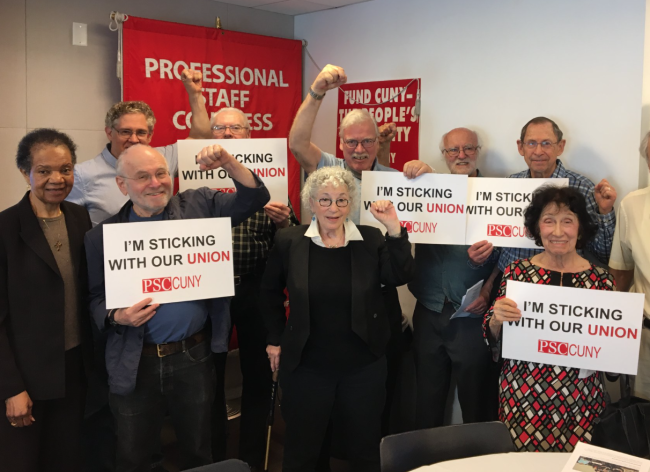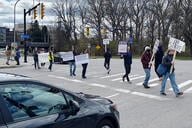You have /5 articles left.
Sign up for a free account or log in.

CUNY union members
In a decision that has to the potential to gut public-sector unions, the U.S. Supreme Court on Wednesday ruled 5 to 4 that non-union-member public employees don’t have to pay “fair share” or “agency” fees to the unions that represent them in collective bargaining and, in many cases, grievances.
The decision in the case -- Janus v. AFSCME Council 31 -- doesn’t mean the end of unions at public institutions, since some faculty and other employee unions are thriving in right-to-work states that ban such fees. But it means that unions in all states will have to work harder to convince workers to become and stay members -- and pay the regular fees that support administrative staff and other activities. Agency fees are distinct from full dues and may not be used to fund unions' explicitly political activity, but they make up a major share of union fees.
While the high court was widely expected to rule as it did, higher education unions were quick to criticize the decision as a politically motivated example of judicial overreach that will hurt workers and, by extension, higher education.
Frederick E. Kowal, president of the 42,000-member United University Professions union of State University of New York System faculty members and other employees, for example, said in a statement that if “the super-rich and the corporate elites that are behind this case, and so many others like it, think that this ruling is the end of unions, they are sadly mistaken.”
The case is “a blow to working families,” he said, but “we are stronger than those who are trying to blot out unions know. We aren’t going anywhere.” The UUP is affiliated with the American Federation of Teachers and the National Education Association.
Pro-union faculty members also flooded social media with pledges to remain dues-paying members and otherwise support their unions going forward.
Others declared the ruling a victory for free speech and individual freedom. Unions "will now have to prioritize how they spend their funds without the revenue stream of nonmembers’ compelled agency fees," said Elizabeth Slattery, a legal expert with the Heritage Foundation, which works to advance many conservative principles.
Touching on the K-12 school choice debate, Slattery in a statement also called the decision "a big win for nonunion teachers. The public sector unions in the education system can no longer use compelled fees to lobby against education choice and other political causes that nonunion teachers support."
A Matter of Free Speech
Janus, as the case is known, was brought by Mark Janus, a child-support specialist with the State of Illinois Department of Healthcare and Family Services. Janus is a not a union member and said having to pay his union’s agency fees violates his First Amendment rights, as the union advocates for political causes that he does not support, even in simply bargaining collectively with a state entity. In Janus’s case, agency fees made up 78 percent of full union dues, or about $23 per pay period.
As predicted, the justices broke along conservative and liberal lines to side with Janus against the American Federation of State, County and Municipal Employees. This was the fourth high-profile case in about as many years to target public employee union fees on free speech grounds. The most recent one, Friedrichs v. California Teachers Association, involved K-12 teachers in California and deadlocked in a 4-to-4 vote in 2016, after the death of conservative justice Antonin Scalia. His replacement, Justice Neil Gorsuch, cast the decisive vote against agency fees this time around.
In his majority opinion on Janus, Justice Samuel Alito wrote that states and public-sector unions may no longer extract agency fees from nonconsenting employees, as doing violates the First Amendment. Employees must rather choose to support the union before money is taken from them, he said. The idea is that they should have to "opt in" to union fees rather than "opt out."
While the Supreme Court generally stands by the decisions of past justices under the principle of stare decisis, Alito -- echoing comments he’s made in other cases -- took aim at the high court’s 1977 decision in Abood v. Detroit Board of Education. In that case, the justices unanimously found that a public school teacher who didn’t want to contribute financially to his union, citing political differences, had to pay it agency fees anyway, to cover the cost of collective bargaining and other nonpolitical activities from which he benefited.
Overruling Abood and calling it poorly decided, Alito in the Janus opinion wrote that Abood was inconsistent with standard First Amendment principles.
Referencing Abood’s logic, Alito said that agency fees can’t be upheld on the ground that they promote an interest in "labor peace," since millions of public employees in the nation’s 28 right-to-work states work harmoniously under exclusive union representation.
Again using the language of Abood, Alito also said that mandating agency fees to manage “free riders” is not a compelling state interest. States can find other, less “restrictive” ways of managing nonunion members who arguably take advantage of union benefits without paying for them, he said. He even suggested that unions ask nonmembers to pay for representation in grievances or contract disputes. Currently, states decide whether public-sector unions must represent nonmembers in these situations. Most say they must.
And while Janus's union had argued that Abood is in fact supported by the First Amendment’s true meaning, Alito said there’s no evidence for that -- and that the opposite may in fact be true.
“Because the compelled subsidization of private speech seriously impinges on First Amendment rights, it cannot be casually allowed,” Alito wrote. “Forcing free and independent individuals to endorse ideas they find objectionable is always demeaning.”
Alito was joined in his opinion by Chief Justice John G. Roberts and Justices Clarence Thomas, Neil Gorsuch and Anthony Kennedy -- who on Wednesday also announced his retirement, stirring fears among many that he'll be replaced by a harder-line conservative.
‘Judicial Disruption’
Justices Sonia Sotomayor and Elena Kagan filed dissents, with Kagan joined by Ruth Bader Ginsburg, Stephen Breyer and Sotomayor.
Kagan chided the majority’s action in her dissent, saying that the court finally succeeded “in its six-year campaign to reverse Abood,” with yet unforeseen, “large-scale consequences.”
“Rarely if ever has the court overruled a decision -- let alone one of this import -- with so little regard for the usual principles of stare decisis,” she said. “There are no special justifications for reversing Abood. It has proved workable. No recent developments have eroded its underpinnings. And it is deeply entrenched, in both the law and the real world. More than 20 states have statutory schemes built on the decision. Those laws underpin thousands of ongoing contracts involving millions of employees.”
Reliance interests “do not come any stronger than those surrounding Abood. And likewise, judicial disruption does not get any greater than what the court does today,” Kagan added.
William Herbert, executive director of the National Center for the Study of Collective Bargaining in Higher Education and the Professions at Hunter College of the City University of New York, echoed some of Kagan’s comments, calling the Janus decision “a clear form of judicial activism because it wiped out what states have been doing and deciding in terms of how collective bargaining should happen in their state.”
What the high court did “is what legislatures do, come up with public policy,” he continued. “It has now eviscerated states’ ability to do that.”
A ‘Mixed Bag’ for Higher Ed
As for how Janus will impact academic workplaces, experts said it’s probably too soon to tell. The potential for union devastation is there, some said, but so is reinvigoration of the union cause.
Herbert said that some states, including New York, adopted statutory changes ahead of Janus to allow unions access to the information they need to survive, such as names of potential members and chances to meet with them. Now is an opportunity to for administrators and unions elsewhere “to sit down and talk about the same things,” he said, “so these relationships won’t be disrupted.”
Rudy Fichtenbaum, president of the American Association of University Professors and a professor of economics at Wright State University, said he guessed the decision’s impact will be a “mixed bag.” At institutions with historically high union membership, there’s a “better chance of maintaining that membership,” as evidenced by AAUP union chapters in Michigan, which became right-to-work in 2012, he said. “Many of them had 90 percent-plus membership before right-to-work, and those institutions so far have not seen any significant decline in membership.”
But at institutions with low union membership, Fichtenbaum said, it’s “going to be a lot harder to retain members, and since they have been more dependent on fair-share fees, the impact of Janus will be more severe.”
Ian Robinson, a lecturer and associate research scientist in sociology at the University of Michigan at Ann Arbor and president of that university system’s AFT-affiliated lecturers’ union, said he’s heard different things from different unions across his state about the impact of right-to-work. His particular union’s last contract only expired about a month ago, so right-to-work is only now coming into play. But making the case for continued union membership under right-to-work got easier with the tentative contract the union just negotiated. It includes raises of up to 50 percent for entry-level lecturers within three years, among other gains.
Still, he said, “not all unions have been in a position to negotiate an agreement with the gains that we have, and not all unions will be able to make such an obvious case for union membership as we have.”
Robinson, who studies labor and globalization, described Janus as poorly reasoned and “substantively a bad decision.” Beyond that, he said, “It hurts organized labor by reducing the resources available to it, which is the idea behind right-to-work.”
Observing that a case that arguably serves special interests rested on the First Amendment, Robinson said it’s “fascinating how an amendment so important to democracy is being used to dismantle democracy.”
Catherine L. Fisk, Barbara Nachtrieb Armstrong Professor of Law at the University of California, Berkeley, has previously argued that one way to manage unions’ “free rider” problem is to deny nonmembers union representation even in collective bargaining. That's something similar to what Alito suggested regarding grievances, except that Fisk's solution would require getting rid of a federal rule about exclusive representation.
Fisk said Wednesday that while Alito is clearly convinced that agency fees violate the First Amendment, he didn't clarify whether the First Amendment also affords unions the freedom to decline to represent "free riders" in their grievances. To that point, Florida, which is a relative outlier in allowing public unions to choose whether they will represent nonmembers in grievances, has relatively high faculty union participation. And union leaders there say that such representation is a membership draw.
Asked about comments onlookers made as to how Janus had inspired them to refuse to pay taxes because they disagree with government policies, or to refuse to pay bar association dues for the same reasons, Fisk said it’s “only half a joke.”
People are compelled every day to pay money to groups that spend money on speech, down to home owners’ associations, she said. Employees are required to contribute to health insurance and pension plans, which also spend money on speech down the line, and the same goes for those who invest in stocks.
‘Permanent Organizing Mode’
Raymond Hogler, a professor of management at Colorado State University, noted that Alito repeatedly used the word “private” to distinguish union dues from other compelled payments, such as taxes. So his theory “appears to be that compulsory payments to government are legitimate because we elected those officials,” Hogler said. “My response would be that unions are elected also, and it’s much easier to get rid of a union than, say, Trump.”
He noted that in Colorado, unions may vote once for union representation and then, under state law, vote to have union security in their contracts. If approved, the union can negotiate for compulsory dues. "All public unions have to do is adopt the same process, allow employees to vote if they want union security in a contract," he said. "If approved, then it’s legal. And there are no constitutional problems, because employees chose it.”
Over all, Hogler said that unions at public institutions “will now have to be in permanent organizing mode, constantly recruiting new members if they want to remain effective. Those who are successful in communicating with members and potential members about the benefits of unionization will remain strong. Those who fail to organize and recruit new members will be weakened by Janus.” But the wave of recent K-12 teacher protests nationwide demonstrates what's at stake, he said.
Stephanie Dodge Gournis, a partner at Drinker Biddle who represents management in labor matters, told Inside Higher Ed that despite union “propaganda” about Janus harming employee rights and higher education, its real impact is “less than certain.”
While the decision will negatively impact "the bottom line of public sector labor organizations that previously have benefited from fair share dues,” she said, successful union organizing campaigns in right-to-work states show that "the elimination of forced dues deductions does not eliminate union organizing.”
Ultimately, she said, Janus “may do nothing more than give union greater incentive to increase union organizing,” including at private colleges and universities covered by the National Labor Relations Act. Tenure-track and tenured faculty members at these institutions aren't entitled to collective bargaining based on a longstanding legal precedent saying that they are managers, but adjunct faculty and graduate student unionization is on the rise. Graduate students, in particular, are ramping up efforts to get their administrations to bargain collectively with them outside of National Labor Relations Board channels, since a Trump-appointed board could reverse a 2016 decision in their favor.





